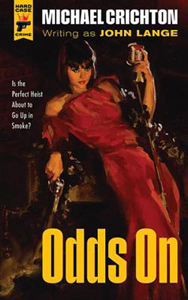The layperson knows Michael Crichton’s first novel as being “The Andromeda Strain” (1969), but his first published novel was actually “Odds On” (1966). He wrote it under the name John Lange because he didn’t want his med school teachers to know he was writing pulp novels to make a few bucks on the side (and also because he enjoyed writing). While Crichton is known as a versatile author, the eight Lange novels open up a whole new realm.
In the pulp tradition
It sounds crazy to say that the first thing Crichton mastered was the art of the sex scene, but the evidence is here in “Odds On,” which fits very much in the pulp tradition as three thieves team up to rob the Reina, a luxury hotel on the coast of Spain. These scenes usually fit in with character building, not being too gratuitous, although it’s a little ridiculous that all three thieves are alpha-male ladies’ men.
Crichton is about halfway home on character writing. “Odds On” has a large cast, and about half of the people have distinct traits that help them stand out. For example, old Miss Shaw likes bananas so much that she’s often seen with whole bunches nearby while lounging poolside.

“Odds On” (1966)
Author: Michael Crichton, writing as John Lange
Series: John Lange No. 1
Genre: Hardboiled crime
Setting: Coastal Spain, 1966
Among the three thieves, Jencks is ugly and built like a boxer, Miguel is of mixed race, and Bryan … well, he’s the other guy. Like I say, Crichton’s descriptive abilities aren’t employed across the board. Also, I’m struck by how – even when the descriptions are good – there’s something a tad amateurish here. I think it’s because he doesn’t write many moments of people thinking about, or getting invested in, their interactions with others.
An exception is the almost-couple known as Jenny and Peter. He defines himself by her rejections of his advances, she defines herself by her need to attract a more manly man. These two pop off the page more than anyone else. Jenny’s issues might interest a modern sex therapist, and her portrayal might be viewed as either un-PC or progressive, depending on who is analyzing the character. Peter is a typical poor schlep, but he has presence on the page.
Not like his later works
While I wouldn’t have guessed Lange is Crichton without being informed, there is a Crichtonian element in play: Jencks runs a computer probability program to determine the odds of successfully robbing the hotel, and the best strategies. Yes, these 1960s analytics would make the modern Tampa Bay Rays proud.
That said, the author’s description of how computers work – with punch-cards and spools of tape – is historically fascinating, while also providing some basics on coding. (See Lincoln Child’s “Death Match” for another strong novel about computer coding and probability analysis.)
So “Odds On” is before its time in that sense, although Jencks’ talk about mathematics is a small part of the book; it’s not a through-line like it would probably be in a later Crichton novel. Even with the computer-assisted planning, though, the novel never feels predictable.
The whole way, I want the trio to pull off the heist, mainly because they are the main characters (although as far as bad guys go, they aren’t that bad; they aren’t killers). But, even if the computer’s prediction turns out wrong, the book’s conclusion is admirably wild.
“Odds On” is also very of its time in its dime-store nature, with alpha males and femme fatales. The time period particularly stands out with references to Spain being a brutal police state, although that’s a minor part of the novel.
Better stuff is to come from Crichton, but “Odds On” is an impressive debut – not merely engaging as a historical artifact, but also as a good read. I look forward to reading more Lange books, not expecting them to be unheralded masterpieces, but rather tasty snacks between the feasts that are Crichton’s books under his own name.


